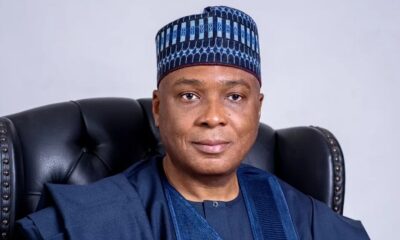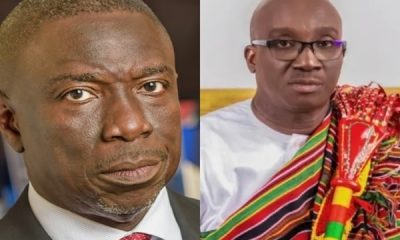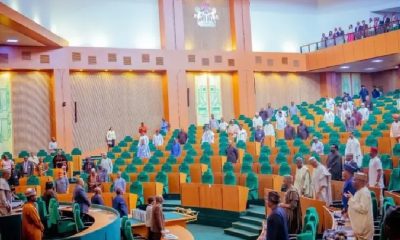Economy
Zenith Bank Records Triple-Digit Growth In Q3 2024

Zenith Bank Plc has announced its unaudited results for the third quarter ended 30 September 2024, recording a remarkable triple-digit growth of 118% from N1.33 trillion reported in Q3 2023 to N2.9 trillion in Q3 2024. This performance underscores the Group’s resilience and market leadership in spite of the challenging macroeconomic environment.
According to the Bank’s unaudited third quarter financial results presented to the Nigerian Exchange (NGX), the triple-digit growth in the topline also led to an increase in the bottom line, as the Group recorded a 99% Year on Year (YoY) increase in profit before tax, growing from N505 billion in Q3 2023 to N1.0 trillion in Q3 2024. Profit after tax equally grew by 91% from N434.2 billion to N827 billion in the same period.
The growth in the topline was driven by the expansion of both interest income and non-interest income. Interest income saw a notable 190% rise to N1.95 trillion, attributed to the high-yield environment. Non-interest income rose by 41% to N856 billion, bolstered by substantial growth in fees and commissions, which highlights the strength of Zenith Bank’s retail growth and the robust performance of its digital channels during the reporting period. The robust increase in profitability reflects the Bank’s focus on operational efficiency and strong risk management practices. Earnings per share (EPS) nearly doubled, rising to N26.34 from N13.82 in Q3 2023, underscoring Zenith Bank’s strong value creation for shareholders.
The Bank’s balance sheet grew significantly, with total assets growing by 49% to N30.4 trillion, largely supported by customer deposits, which rose by 42% to N21.6 trillion. This growth in deposits was broad-based across corporate and retail segments, highlighting the Bank’s deepening reach and customer loyalty. Gross loans increased by 46% to N10.3 trillion, underscoring the commitment to supporting strategic sectors in the economy.
Capital adequacy ratio remained strong, improving to 21.9%, well above regulatory requirements. The return on average equity (ROAE) stood at 37.8%, up from 35.1%, while return on average assets (ROAA) also improved to 4.3% as Zenith Bank maximized its asset base. Cost of funds increased to 4.3%, reflecting the broader market trend of rising interest rates, while the cost of risk was maintained at 7.3%, underscoring the Bank’s proactive approach in provisioning for credit risk. The Bank’s cost-to-income ratio rose to 39.5%, reflecting the impact of strategic investments in technology and capacity building aimed at supporting long-term growth, even as it continues to strive for greater operational efficiency.
Zenith Bank’s asset quality remains a cornerstone of its strength, with a non-performing loan (NPL) ratio of 4.5%, within regulatory limits. A high coverage ratio of 198.4% underscores the Bank’s disciplined approach to risk management, positioning it for resilience in the face of market volatility while supporting stable loan growth.
Zenith Bank remains steadfast in its commitment to sustainable growth and value creation. The Bank launched a capital raise program on August 1, 2024, consisting of a combined Rights Issue and Public Offer. This capital raise was driven by the Central Bank of Nigeria (CBN)’s recapitalization directive for commercial banks issued in March 2024. While the Bank awaits final capital verification approvals from authorities, the fundraising exercise was successful, reflecting strong confidence in Zenith Bank’s brand.
The additional capital will enhance the Bank’s ability to expand its product offerings, deepen its penetration in strategic sectors, boost lending to the real sector and pursue its African and global expansion plan. In furtherance of this, the Bank in September 2024 received regulatory approval for the establishment of a Zenith Bank branch in Paris, France, which is fully operational and will enhance the Bank’s product offerings in international markets.
With a strengthened capital base, Zenith Bank is well-positioned to navigate the evolving economic landscape, while putting best-practice sustainability standards at the heart of its business. The Bank will also continue to prioritize opportunities that enhance stakeholder value and a strong compliance and corporate governance culture, which will reinforce the its leadership position within Nigeria’s financial sector and drive long-term growth.
Economy
More Nigerians to experience poverty by 2027 – World Bank

The World Bank’s latest Africa’s Pulse report has projects a grim future for Nigeria, with poverty expected to rise by 3.6 percentage points by 2027.
Released during the IMF and World Bank Spring Meetings in Washington, DC, the report cites Nigeria’s reliance on oil, economic fragility, and governance challenges as key drivers.
It highlights the country’s structural economic weaknesses, dependence on oil revenues, and national fragility as key barriers to meaningful poverty reduction.
“Poverty in resource-rich, fragile countries, including large economies like Nigeria and the Democratic Republic of Congo, is projected to increase by 3.6 percentage points between 2022 and 2027,” the report stated.
Despite recent growth in Nigeria’s non-oil sector during the last quarter of 2024, the World Bank warns that this progress is unlikely to translate into widespread poverty alleviation due to ongoing fiscal and institutional challenges.
The report emphasizes that Sub-Saharan Africa remains the world’s poorest region, with an overwhelming 80% of the globe’s 695 million extreme poor residing there in 2024.
Within the region, half of the 560 million extremely poor people were located in just four countries, including Nigeria.
In stark contrast, South Asia accounted for 8% of the world’s extremely poor population, East Asia and the Pacific 2%, the Middle East and North Africa 5%, and Latin America and the Caribbean 3%.
The World Bank attributes the rising poverty in Nigeria and similar economies to weakening oil prices and fragile governance structures, noting: “This follows a well-established pattern whereby resource wealth combined with fragility or conflict is associated with the highest poverty rates, averaging 46% in 2024, which is 13 percentage points higher than in non-fragile, resource-rich countries.”
Meanwhile, non-resource-rich countries in Africa are experiencing stronger economic growth and faster poverty reduction, buoyed by high agricultural commodity prices and more resilient fiscal policies.
To reverse Nigeria’s downward poverty trend, the World Bank recommends reforms that prioritize inclusive economic growth and stronger public financial management.
It calls on the government to focus on “improving fiscal management and building a stronger fiscal contract with citizens to promote inclusive economic development and long-term poverty alleviation.”
Economy
SEE current exchange rate of the Dollar to Naira

What Is the Dollar to Naira Exchange Rate at the Black Market (Aboki FX)?
Here is the Dollar to Naira exchange rate at the parallel market, popularly known as the black market (Aboki fx), for Tuesday, April 23, 2025.
You can exchange your dollars for naira at the following rates:
Black Market Exchange Rate (Lagos – April 23, 2025):
According to sources at the Bureau De Change (BDC), the exchange rate at the Lagos parallel market saw traders buying at ₦1610 and selling at ₦1620 per US dollar.
It’s important to note that the Central Bank of Nigeria (CBN) does not recognize the black market. The CBN advises individuals seeking foreign exchange transactions to do so through their banks.
Dollar to Naira Exchange Rates
Market Type Buying Rate Selling Rate
Black Market ₦1610 ₦1620
CBN Official Rate ₦1591 (Low) ₦1606 (High)
Note: Forex rates vary across dealers and regions, and actual rates may differ from those listed.
Meanwhile, the Nigeria Customs Service (NCS) has announced the seizure of 298 smuggled items worth ₦7.6 billion between January and March 2025. The NCS also disclosed that it generated a total revenue of ₦1.75 trillion in the first quarter of the year.
Economy
Volvo announces termination of 800 U.S. workers, cites tariff, market decline

Volvo Group has announced plans to lay off up to 800 workers at three of its U.S. facilities over the next three months, citing ongoing market uncertainty and declining demand exacerbated by tariffs introduced under the administration of President Donald Trump.
The affected locations include the Mack Trucks plant in Macungie, Pennsylvania, as well as Volvo Group sites in Dublin, Virginia, and Hagerstown, Maryland.
In a statement on Friday, Volvo Group North America confirmed that between 550 and 800 employees would be impacted.
The company, a subsidiary of Sweden’s AB Volvo, employs nearly 20,000 people across North America.
The layoffs come amid wider turmoil in the automotive and manufacturing sectors, as shifting U.S. trade policy and a series of tariffs continue to drive up production costs. Economists have pointed to the uncertainty surrounding Trump’s trade strategy as a factor undermining both business and consumer confidence, with concerns mounting over a potential economic slowdown or recession.
According to Volvo, the company is grappling with a decline in heavy-duty truck orders, driven by instability in freight rates, anticipated regulatory changes, and the growing financial burden of tariffs. “We regret having to take this action, but we need to align production with reduced demand for our vehicles,” a company spokesperson stated in an email quoted by Reuters.
Volvo’s announcement marks another blow to an industry already navigating a complex web of supply chain challenges and fluctuating market conditions, with other manufacturers also warning of potential cost hikes and disruptions tied to global trade disputes.
-

 News17 hours ago
News17 hours ago2027: Pro-Fubara protesters want suspended Gov to run as Atiku’s VP(Video)
-

 News20 hours ago
News20 hours agoOborevwori /Okowa: PDP experiencing a rebirth and will soon bounce back-Saraki declares
-

 News18 hours ago
News18 hours agoEdo poll: How APC allegedly offered witnesses N30m bribe
-

 News18 hours ago
News18 hours agoFlights resume as NiMET unions suspend strike
-

 News11 hours ago
News11 hours agoRivers State is yet to fully stabilise– Ibas
-

 News14 hours ago
News14 hours agoOsun PDP Reps Dismiss Defection Claims, Pledge Support for Adeleke
-

 News18 hours ago
News18 hours agoOver 26,000 Lagos students failed 2024 WASSCE despite govt paying over N1.5bn WAEC fees
-

 News19 hours ago
News19 hours agoBenue still boiling as gunmen hijack vehicles, kidnap 19






